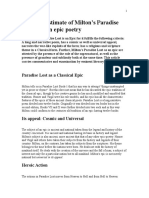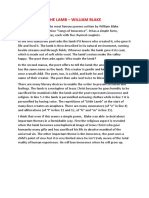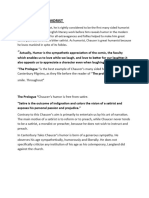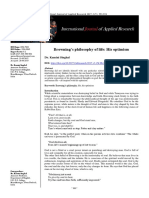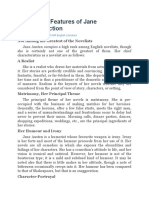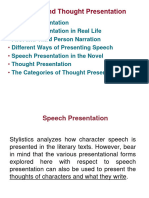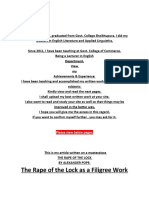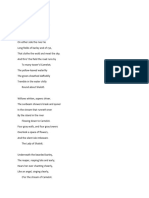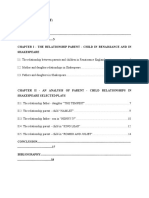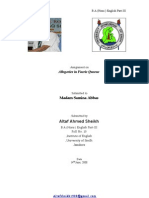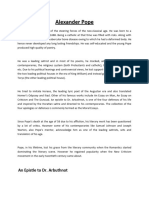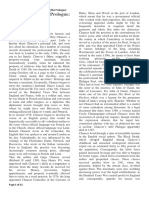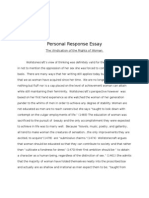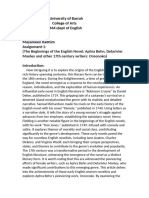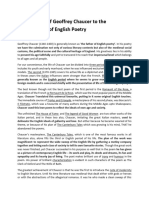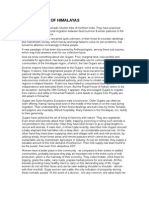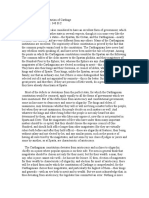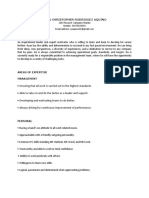Why Chaucer is called the father of English poetry?
Or
What solid contribution did he make to English poetry, drama and novel?
Or
"Chaucer is the earliest of the great moderns." -Discuss.
Answer: Chaucer symbolizes, as no other writer does, the Middle Ages. He stands in much the
same relation to the life of his time as Alexander Pope does to the 18th century, and Tennyson to
the Victorian era. And Chaucer’s place in English literature is even more important than theirs,
for he is the first great English writer—the first man to use "naked words" in English, the first to
make our composite language a thing compact and vital.
According to John Dryden, Chaucer is the father of English poetry. Dryden venerates Chaucer as
highly as the Greeks venerated Homer and the Romans venerated Virgil. "Chaucer", says Dryden,
"is a perpetual foundation of good sense. He is learned in all sciences and therefore speaks
properly on all subjects. As he knew what to say, so he knew also when to leave off."
Chaucer is regarded as the first great modern. In those dark days when the light of modernism
had not yet been visible on the horizon, Chaucer anticipated the modern taste and the 'modern
mind'. In his poetry, he introduced qualities for advanced of his time.
�With Chaucer, the English language and English literature grew at a bound to full maturity. No
other Middle English writer has his skill, his range, his complexity, and his large humane outlook.
The First great National Poet
Chaucer was the first great national poet giving full expression to the new hopes and aspirations
of the people of his times. In the picture of The Canterbury Tales, Chaucer makes it his business
like Shakespeare to paint life as he sees it and leaves others to draw the moral. The foundation
of Chaucer's art lies in English life and English character.
Chaucer's Narrative Art: Description of men, Manners and Places:
Chaucer stands triumphantly in his power of description. His description and narrative gifts truly
possess rare qualities. He, in fact, remains the first great English story-teller in verse. The
employment of verse, as a vehicle of story-telling is certainly Chaucer's most notable
contribution and the modern age of English literature is greatly indebted to him in this respect.
Chaucer's best descriptions of men, manners and places are of the first rank in their beauty,
impressiveness and humour. His power of describing his fellowmen, the common people with all
their merits and demerits, their tastes and temperaments was unique. His The Prologue to the
Canterbury Tales is a picture gallery bringing in its scope all classes of people ranging from the
Knight to Miller and the Cook. In fact, he is the supreme story-teller. In his stories the narration,
inspite of certain digression and philosophical reflections is straight forward and unhampered,
he introduces humour in his narration and makes his stories life like and living.
Chaucer's greatness as a poet is strongly founded, besides other qualities mainly on his
�matchless narrative skill. Pre-eminently his fame rests on his power as a narrator, the power to
tell on interesting story supremely well. He is one of the world's three or four story tellers. The
Canterbury Tales is a collection of excellently narrated stories. The various tales are narrated so
skilfully that they engage and entertain us very well.
Chaucer's Art of Characterization
Chaucer is the first great painter of character in English literature. In fact, next to Shakespeare,
he is the greatest master in this field. In The Canterbury Tales, Chaucer takes to the study of
contemporary English society and employs poetry with tolerant curiosity to the study of men
and manner. He presents his characters in a masterly manner. His characters are both individuals
and types. They are timeless creations on a time determined stage. William Blake points out that
the characters of Chaucer's Pilgrims are the characters which compose all ages and nations. His
characters like those of Shakespeare are life like and we cannot forget them. The Knight, the
Friar, the Pardoner, the Wife of Bath, the Doctor of Physic, the Squire, the Yeoman, the Prioress,
the Monk, the Merchant, a Good Wife, a Shipman, a Cook, a Parson, a ploughman, a Reeve, a
Miller, a Summoner, etc. are living characters and have eternal freshness about them. Their traits
are universal, i.e. the lineaments of universal human life, beyond which Nature never steps. In
fact Chaucer presents the 14th century life and characters as vividly and clearly as Tennyson did
later in the Victorian Age. His characters form a picture gallery of the 14th century life.
Humour, Satire, Irony & Pathos
One of the qualities that give to Chaucer's characters their amazing life and realism is its humour.
He may be regarded as the first great English humourist. No English literary work before him
reveals humour in the modern sense. He possesses all the characteristics of a great humorist. He
has catholicity and tolerance of spirit to save it from slipping into satire. He is in the grand
tradition of the great humorists and while his humour may have the peculiar English tinge and
flavor it has also the essence of all true humour. This places him in the very first line of humorists
— Shakespeare, Cervants, Rabelais, Molier and Dickens.
�Chaucer's humour is always sympathetic. His understanding sympathy with the seamy side of
life, his keen sense of the ludicrous, made him alive to any incongruity or absurdity.
Chaucer's humour is accompanied by exquisite and unlabored pathos. Chaucer's pathos is not
sentimental. He exhibits sympathy for inevitable sorrow. This distinguishes him from Boccaccio
and makes him the precursor of Hamlet and Othello. In fact Chaucer's humour is natural and
spontaneous. His humour is all pervading and all pervasive like Shakespeare. It is characterized
by restraint. Shakespeare observes that "brevity is the soul of wit." and of course brevity is the
soul of Chaucer's humour. After all, Chaucer was essentially the poet of man and he had large
humanity and good humored tolerance. His humour is modern and it is essentially human.
Therefore it is based on characteristically Renaissance concept. The underlying spirit of his
humour is that of the Renaissance, it is not medieval.
Realism of Chaucer
Modern Poetry is characterized by realism. The modern poet is a keen observer of the various
tendencies of his times which are being put by him in poetry. This modern note of realism had
been sounded by Chaucer long ago in the 14th century. He was a great observer of men and had
an extra-ordinary insight into human nature. He made a thorough study of his time. The
Prologue displays his profound interest in the world and its temporal activities and his human
and humane outlook.
His Humanistic Outlook
His descriptions of his fellow men reveal his wide humanity and prepare the way for
�Shakespeare. His wide sympathy and gentle humanity make him lovable among the English
poets. He is not repelled. He takes interest in his fellowmen. He has no disdain for the fools and
no disgust for rascals. He is the poet of humanity.
Dramatic elements in Chaucer's Poetry
Chaucer is essentially a dramatist. His characters are not puppets, but men and women of flesh
and blood. His characters are full of vitality. They are life-like, not shadowy. They are not on y
types but also individuals. Every character has his own individuality and distinct personality. The
dramatic presentation is superbly used by Chaucer in The Canterbury Tales. His method of
narration is dramatic. All his characters talk in a dramatic manner.
In fact the dramatic quality of Chaucer's work distinguishes him from his predecessors and
contemporaries in the field of narration.
As a forerunner of the English Novel
Chaucer has been called the father of English poetry. But he is also the grandfather of the English
Novel. In his Troilus and Criseyda and The Canterbury Tales, we have the seeds of the novel
which was cultivated by others later. The Prologue to the Canterbury Tales is a prologue to
modern fiction. It possesses all the fundamental characteristics of a novel. It is indeed a novel in
miniature. He had the sweetness of Goldsmith, the compassionate realism and humour of
Fielding and the high chivalrous tone of Sir Walter Scott.
�We may summarize Chaucer's achievement by saying that he is the earliest of the great
moderns. In comparison with the poets of his own time and with those of the succeeding
century the advance he makes is almost startling. All the Chaucerian features help to create the
modern atmosphere for the later poets, the shrewd and placidly humorous observation of the
wide humanity, the quick aptness of the phrase, the dexterous touch upon the meter and above
all the fresh and formative spirit—the genius turning gross into gold. Dr Johnson has rightly said
that he had found it brick and left it marble. So Chaucer is rightly called the father of English
poetry. There is nothing primitive about Chaucer. His work at its best is polished, cultivated and
masterly. He was heir to the great European tradition of literature and philosophy. Chaucer is,
indeed a genius. He stands alone, and for nearly two hundred years on one dare claim equally
with him. With Chaucer the English language and English literature grew at a bound to full
maturity.







